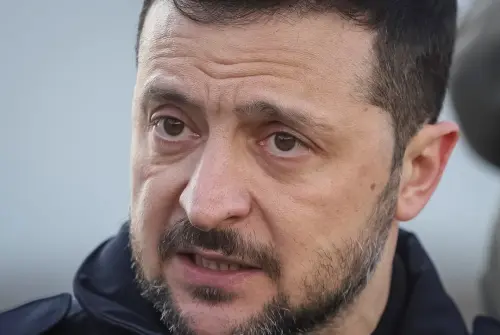KYIV, Feb 13 (Reuters) - Ukrainians expressed concerns on Thursday that U.S. President Donald Trump might be on the verge of betraying their country following his discussion with Russian President Vladimir Putin. Yet, some cautiously welcomed his efforts to promptly end the conflict.
Trump's conversation, the first by a U.S. leader since Moscow's invasion of Ukraine in February 2022, came after statements from his defense chief regarding the restoration of Ukraine's borders and its NATO aspirations.
Reflecting on the situation, 23-year-old Kyiv resident Myroslava Lesko remarked, "It truly seems like they are willing to surrender Ukraine because I fail to see any benefits for our country in these negotiations or Trump's language."
While Ukraine has been striving to establish closer ties with the new Trump administration to gain U.S. support, Russian forces, already controlling a fifth of Ukraine, continue to exert pressure on the battlefield.
Ukraine seeks White House support for any peace talks, with security guarantees that would prevent Russia from launching another invasion.
Following Trump's discussion with Putin and remarks from Pete Hegseth questioning the feasibility of Ukraine joining NATO and ruling out U.S. troop deployment as peacekeepers, some believe that Washington is losing its negotiation leverage.
Trump also spoke with Ukrainian President Volodymyr Zelenskiy after his conversation with Putin.
In interviews with Reuters, Kyiv residents expressed a mix of concern and cautious optimism about the prospect of expedited peace talks.
"Trump is a determined individual," said 60-year-old Hryhoriy Buhoyets. "He can make any decision he chooses, and as far as Ukraine is concerned, I believe he has some strategies in mind."
Maksym Zhorin, deputy commander of the Third Assault Brigade engaged in the conflict, mentioned on the Telegram app that he never anticipated swift NATO membership for Ukraine.
Tymofiy Mylovanov, president of the Kyiv School of Economics, stated that it appears the Trump administration's viewpoints align closely with those of the previous Joe Biden administration.
Some Ukrainians are frustrated that despite receiving substantial military aid from Biden, the U.S. did not do enough to shift the conflict in Kyiv's favor.
Foreign Minister Andrii Sybiha emphasized in an interview with Le Monde newspaper that Ukraine and Europe should not be excluded from forthcoming peace negotiations.
Oleksandr Merezhko, head of the Ukrainian parliament's foreign affairs committee, stressed the importance of consistent communication between Zelenskiy and Trump, advocating for ongoing discussions rather than sporadic talks.
Moreover, he emphasized Ukraine's continued pursuit of NATO membership, despite Hegseth's remarks: "Our survival hinges on this. We will persist in our efforts because we have no other choice."
Another lawmaker cautioned Ukrainians against jumping to conclusions in light of recent statements, emphasizing the country's resilience in the face of adversity.
"A challenging road lies ahead as we fight for Ukraine, and we will navigate it together," noted Daria Zarivna, an adviser to Zelenskiy's chief of staff.
Hoping for the best, Olena Chiupika, a 38-year-old manager in Kyiv, pointed out Ukraine's success in securing foreign aid that once seemed improbable, such as the F-16 fighter jets provided by allies.
The Munich Security Conference this weekend is expected to be a crucial diplomatic test for Ukraine, where Zelenskiy is slated to meet with U.S. Vice President JD Vance.
As the uncertainties loom, former deputy defense minister Hanna Maliar aptly summarized the situation, saying, "Fasten your seatbelts. We're taking off. A thrilling journey awaits us, with the final destination as yet unknown."
